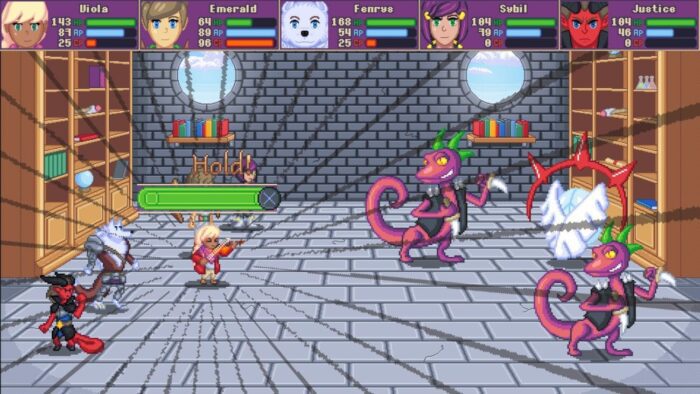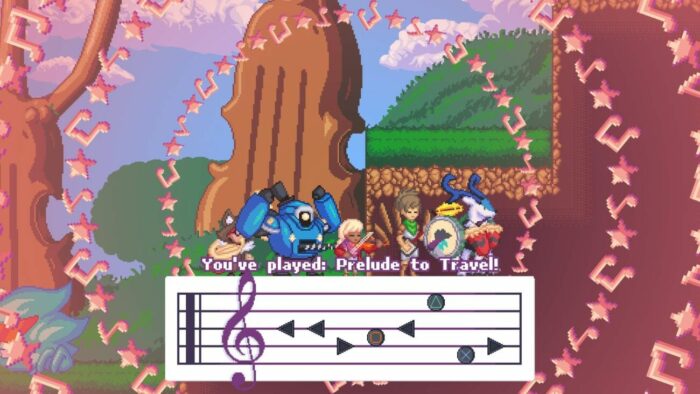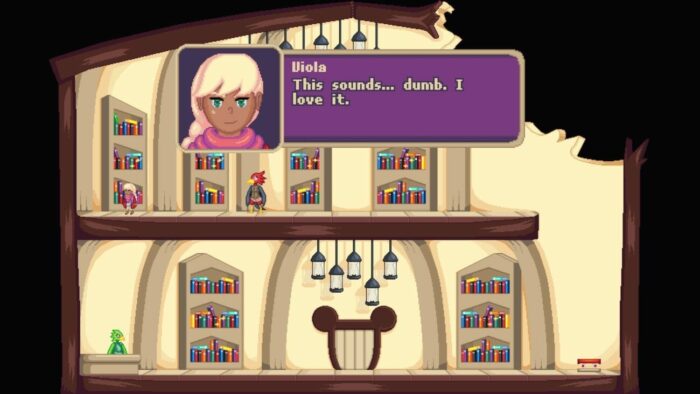Over the last few years, more and more games have come out with lighter themes and overall more wholesome aesthetics. While some use this as a front and have darker, serious undertones (see Undertale, Pony Island) the idea of a purely feel-good game has always been something I’ve been interested in. I play games to unwind, to relax. And Viola: The Heroine’s Melody fits that mood perfectly.
Playing mostly as a traditional turn-based RPG, Viola follows the titular character as she is transported to the world of Vylna, a musical land full of magic, monsters, and talking animals. Each level is a platformer, having you find the magic campfire at the end. Wall-jumping and using cannons will help you get to greater heights and reach chests with potions and equipable gems.

Combat is turn-based with attacks and spells requiring timed button presses, holds, or mashing. Or, you can turn this off completely and have attacks carried out by themselves. In fact, Viola has a variety of accessible options, letting you remap the controller or keyboard completely and change the gameplay to have Double XP or even an invulnerable party. Features like this have become a bit of a hot issue in recent times but I don’t see a problem with them. This is a game where you are here for the story first of all, and giving players an easier way to access that is never a bad thing in my opinion.
Since this is a musical game, there are of course songs to learn and play! Similar to Ocarina of Time songs are played in specific areas to unlock doors or activate progression. If you remember the tune by heart you can play it, or if you’re like me and forgot, you can open the Songbook in the menu and the button prompts will show up to guide you. The songs themselves are charming and fit each action appropriately. Each character plays a different instrument and I found myself excited to unlock the next team member to see what theirs would be!

I was pleasantly surprised to find out not only was one of the characters transgender (it is not story spoilers, but just in case I will avoid saying who) but another is gay. It’s dealt with in a casual way, just banter between party members. And I absolutely loved this. As a queer person myself, it can be tiring to have characters whose defining story arc is the fact that they are LGBT. When it’s just a part of who they are, just like being a hero in a fantasy world is part of who they are, I appreciate it that much more. Being queer is an important part of who I am but it is not the only part. Kudos to developer Jelle van Doorne for this.
Dialogue is cute and at times quite funny, with references to other games and RPGs in general. The musical aspects are in almost every part of the game, from the loading screens, buildings and background elements, even the sun in the sky is a musical note. It doesn’t feel silly but just another part of the fantasy world Viola finds herself in.

I encountered a few small bugs while playing, mostly getting “stuck” on certain spots after jumping. Restarting the game fixed these issues and checkpoints were frequent enough that it didn’t put me too far behind. The game saves after every level as well as when leaving the shop on the overworld. Levels can be replayed (and in fact for some quests you will need to) to grind and go back for items you missed.
Viola is not very graphically intensive and should be able to run on most systems. Keyboard and controllers and both supported. I played with a PS4 controller on my older laptop with no issues.
At a fire, each character can be spoken with to up their friendship rank with Viola, unlocking new spells and abilities and learning more about them. I always liked this in the Grandia series so to have it also unlock new moves is a bonus. Using a character in battle will up their friendship and when they reach A-Rank a personal quest will be unlocked to learn more of their backstory. Once unlocked the quest will appear on the map as an icon of their face on the appropriate level so you know exactly where you need to go.
Even though it is an RPG it has a fairly short playtime, which I’m sure many people will appreciate. I am a fan of games both long and short but some can definitely drag on. This is not the case for Viola. Even with multiple endings, my final playtime was around 10 hours and I feel satisfied with that. Another helpful aspect is that when you beat the game and get the “normal” ending, it will tell you exactly what you need to do to get the “true ending.” While many games leave you guessing or Googling a guide, Viola is nice enough to just let you know how to get there.
Viola manages to use elements from many different things and use them together in a way that works well. It never feels like it’s straight-up copying anything but rather it pays homage and uses those mechanics to become something new. It feels like a labor of love and is a genuinely wholesome adventure.
A Steam key was provided for Viola: The Heroine’s Melody.

